Life
The son of a teacher, Jensen grew up in the rural area Thy and neighbouring Vendsyssel in North Jutland and, after a visit to the Aalborg Cathedral, began a study of Evangelic theology. During World War II, he began to be involved with the Danish resistance movement of the Nazi German occupation of Denmark and was, after his arrest, sent to a concentration camp. After the end of the war, he continued his studies and, according to his ordination, became a pastor of the Danish People's Church in Osted.
He first made literary his debut in 1948 by posting contributions to the magazine Heretica before publishing his first novel, Dommen (The Judgment), in 1949, which was followed by Dæmningen (The Dam) in 1952. Both novels were characterized by the moral problems of the debate about values. In a later period, he wrote narrative novels about the German occupation period, such as Drømmen om det glemte (Dream of the Forgotten, 1954), Gertrud (1956), and I heltespor (In Heroes' Trail, 1960). In 1957, he became a journalist at DR, where he was a TV director from 1959 to 1964.
One of his main works was the 1964 novel Perleporten on the social and ideological opposites in the north fjord in the 1930s, which was well received by critics.
After this great success, which at the same time meant his breakthrough as a writer, he wrote Sagen (The Case) (1971), a continuation of Perleporten (The Pearly Gate), in which the persons from the previous novel were involved in land development trade during the boom period of the 1960s. A further sequel, Kridtstregen (The Line of Chalk, 1976), dealt with the story of two brothers and their German-side volunteership on the Eastern Front during World War II and as a deserter between 1941 and 1945. For Kridtstregen, which was adapted to film in 1983 under the title Forræderne (The Traitors) by Ole Roose, he was awarded the Søren Gyldendal Prize in 1977.
Another focus of the work of Jensen was into Danish lifestyles and attitudes, especially in the remote regions of Denmark. The resulting eight-volume topographic-ethnological work entitled Livet på øerne (Life on the Islands, 1981–1987) was based on a study of all the inhabited islands of Denmark.
After this extensive work, he turned back to fiction and wrote a double novel about the private and moral power struggle of a journalist in Frederikshavn from 1943 to 1957 with Herrens mark (Field of the Lord, also meaning 'helpless', 1990) and Magtens folk (The people of power, 1991). His last novel, Særlige vilkår (Special Conditions, 1994), and the posthumously released Enkebal (Widow's Ball, i.e. Single-Women's Party), dealt especially with the development of the new, stronger role of the women's roles in Denmark between the 1950s and 1970s.
He died before completing his literary project to portray modern Denmark in his childhood region, Vendsyssel. His books combined sociological and psychological curiosity with the precision for details, analytical insight and social overview of a fifty-year social and mental history. In addition to the milieu, he also described landscapes, companies and people of all age groups and thereby continued the traditions of authors of similar fields, such as Henrik Pontoppidan, Martin A. Hansen, Hans Kirk and Hans Scherfig. Through his sense of a comprehensive epic composition and his empathy, he reached a broad reader audience.
Jensen is the father of the prolific and controversial film producer Peter Aalbæk Jensen.
Norwegian literature is literature composed in Norway or by Norwegian people. The history of Norwegian literature starts with the pagan Eddaic poems and skaldic verse of the 9th and 10th centuries with poets such as Bragi Boddason and Eyvindr Skáldaspillir. The arrival of Christianity around the year 1000 brought Norway into contact with European medieval learning, hagiography and history writing. Merged with native oral tradition and Icelandic influence, this was to flower into an active period of literature production in the late 12th and early 13th centuries. Major works of that period include Historia Norwegie, Thidreks saga and Konungs skuggsjá.
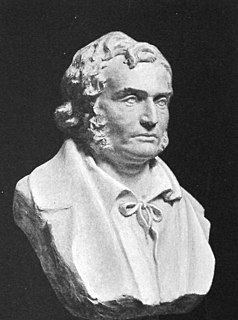
Poul Martin Møller was a Danish academic, writer, and poet. During his lifetime, he gained renown in Denmark for his poetry. After his death, his posthumously published fiction and philosophical writings were well received. He also devoted several decades of study to classical languages and literature. While serving as a professor at the University of Copenhagen, he was a mentor to the philosopher Søren Kierkegaard.

Erik Julius Christian Scavenius was the Danish foreign minister from 1909–1910, 1913–1920 and 1940–1943, and prime minister from 1942 to 1943, during the occupation of Denmark until the Danish elected government ceased to function. He was the foreign minister during some of the most important periods of Denmark's modern history, including the First World War, the plebiscites over the return of northern Schleswig to Denmark, and the German occupation. Scavenius was a member of the Landsting from 1918 to 1920 and from 1925 to 1927 representing the Social Liberal Party. He was chairman of its party organization from 1922 to 1924.

Thisted municipality is a municipality in North Jutland Region, Denmark. The municipality covers an area of 1,072 km², and has a total population of 45,549 (2008). Its mayor is Erik Hove Olesen, a member of the Social Democrats (Socialdemokraterne). The main town and the site of its municipal council is the town of Thisted.
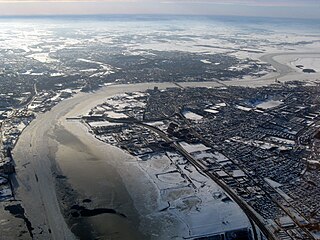
The Limfjord is a shallow part of the sea, located in Denmark where it has been regarded as a fjord ever since Viking times. However, it has inlets both from the North Sea and Kattegat, and hence separates the North Jutlandic Island from the rest of the Jutland Peninsula. The Limfjord extends from Thyborøn Channel on the North Sea to Hals on the Kattegat. It is approximately 180 kilometres long and of an irregular shape with numerous bays, narrowings, and islands, most notably Mors, and the smaller ones Fur, Venø, Jegindø, Egholm and Livø. It is deepest at Hvalpsund.
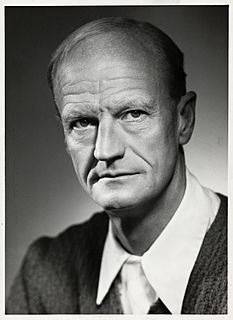
Johan Collett Müller Borgen was a Norwegian author, journalist and critic. His best-known work is the novel Lillelord for which he was awarded the Norwegian Critics Prize for Literature in 1955.

Carsten Jensen is a Danish author and political columnist. He first earned recognition as a literary critic for the Copenhagen daily, Politiken. His novels, including I Have Seen the World Begin (1996), deal with knowledge of the world. For this novel he won the Danish booksellers award De Gyldne Laurbær in 1996. The year 2006 saw the publication of his novel Vi, de druknede, a chronicle about the birth of modern Denmark, seen through the history of his hometown Marstal.
Sigbjørn Hølmebakk was a Norwegian author.
Scandinavian literature or Nordic literature is the literature in the languages of the Nordic countries of Northern Europe. The Nordic countries include Denmark, Finland, Iceland, Norway, Sweden, and Scandinavia's associated autonomous territories. The majority of these nations and regions use North Germanic languages. Although majority of Finns speak Uralic languages, Finnish history and literature are clearly interrelated with those of both Sweden and Norway who have shared control of various areas and who have substantial Sami populations/influences.

Anders Thomas Jensen is a Danish screenwriter and film director. His film Election Night won the 1998 Academy Award for Best Live Action Short Film.

Søren Gyldendal was a Danish bookstore owner who founded Gyldendal which became Denmark's largest publishing house.
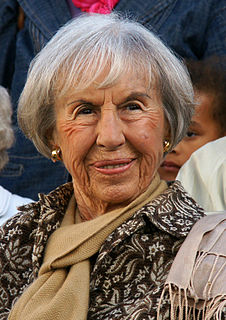
Lise Nørgaard is a Danish journalist and writer known for her precise and often humorous portrayals of Danish cultural life. Nørgaard has written novels, compilations of essays and short stories. The memoir of her childhood, Kun en pige, became a bestseller in 1992 and is considered her masterpiece. The work was made into a feature film in 1995.

Zentropa, or Zentropa Entertainments, is a Danish film company started in 1992 by director Lars von Trier and producer Peter Aalbæk Jensen. Zentropa is named after the train company Zentropa in the film Europa (1991), which started the collaboration between von Trier and Jensen.

Peter Aalbæk Jensen is a Danish film producer who in 1992 with director Lars von Trier founded the Danish film company Zentropa and later its huge studio complex Filmbyen. His father was writer Erik Aalbæk Jensen.
Thorkild Hansen was a Danish novelist most noted for his historical fiction. He is commonly associated with his trilogy about the Danish slave trade including Slavernes øer (1970) for which he received the Nordic Council Literature Prize in 1971.
Carl Erik Soya,, also known by the single appellation Soya, was a Danish author and dramatist. His works were often satirical provocations against double standards and dishonesty. In 1975, Soya received Denmark's foremost literary award, Grand Prize of the Danish Academy.

Danish Academy is an independent organisation founded in 1960 by a circle of Danish intellectuals "to promote Danish esprit and language, especially within the field of literature". It has up to 20 members, currently 18, and is based at Rungstedlund, the former home of author Karen Blixen who was one of the original members. The Academy runs a number of annual literary prizes including most notably its Grand Prize.

The Søren Gyldendal Prize is a Danish literary award, which was established in 1958 by Gyldendal Publishing House. The prize is awarded annually on 12 April, the anniversary of the birthday of Søren Gyldendal (1742-1802) founder of Gyldendal Publishing House. In 1958 the prize was DKK 10,000. In the period 1991 to 2000 it was increased to DKK 100,000. From 2001 to 2008 it was DKK 150,000. Since 2009 it has been DKK 200,000.

Louis Jensen is a Danish author who is an innovator in the international literary trends of flash fiction, metafiction, prose poetry, and magical realism. While he has published more than 90 books for both adults and children, he is best known for his children's books, which include picture books, short stories, flash fiction, creative nonfiction and novels. His work is characterized by wordplay and playful experiments in form and structure, which have led critics to draw comparisons to Borges, Calvino, Gogol, and the poetry of the Oulipo movement. His work is also rooted in the fairy tale and folk tale tradition, and is deeply influenced by the Danish author Hans Christian Andersen.
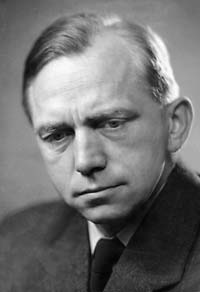
Alfred Martin Jens Hansen (August 20, 1909 – June 27, 1955) was a Danish author who wrote under the name Martin A. Hansen. He is known for his writings as a member of the Danish resistance movement during the German occupation of Denmark in WWII.














